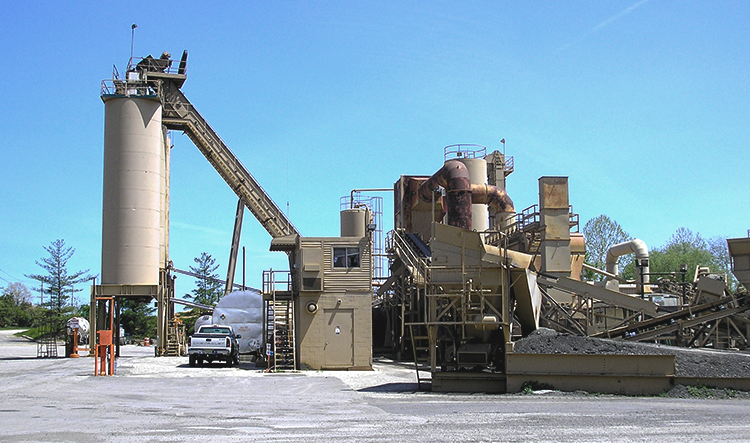Learn what kinds of permits, plans, and approvals an asphalt plant may need.
An asphalt plant, just like any other industrial facility, needs to comply with a wide variety of environmental regulatory requirements. Simply stated, your plant has several environmental permits to comply with. Here we discuss the 5 most common permits and approvals needed at any asphalt facility across the US.
We work with a lot of asphalt companies across the US. One primary service we do with the asphalt industry is conducting environmental audits of companies and individual facilities. An environmental audit is basically us coming in, reviewing your operation, checking which permits & approvals you have, finding out which ones you need to have, and then helping companies create an action plan to get into environmental compliance. Pretty straightforward.
It all usually starts when a prospective client working at an asphalt company or facility goes
"What environmental permits does an asphalt plant need?"
It's a good question, and it's critical to know. Without being in compliance with all your permits and approvals, you could be subject to some hefty enforcement actions, such as monetary fines. It might be expensive to get into compliance, but it's substantially cheaper than getting a fine from an environmental agency or a 3rd party. Trust me, most of our work is done with people who've gotten fines. It's not pretty.

Environmental Permits an Asphalt Plant Needs
The fortunate thing about many plants is this list tends to be pretty basic, at least from our point of view. These are what we find to be the most common environmental permits needed at any asphalt operation:
- Air Permits - At any plant, this is the king of them all. Your facility likely cannot operate without heating asphalt cement, which involves fuel burning and air emissions. In virtually every state in the US, this means an air permit is necessary.
- Stormwater Permits - Industrial operations that have material exposed to stormwater can cause pollution in runoff if not appropriately managed. So, plants are required to have stormwater permits. While there might be some instances where a permit might not be needed, such as if all runoff is contained on site or if the plant is completely contained in a quarry with its own permit, in most cases a permit is needed.
- SPCC Plans - A Spill Prevention Control and Countermeasure plan isn’t a permit or approval, but instead is a Federal regulatory requirement for any facility with over 1,320 gallons of petroleum stored in aboveground tanks. Virtually every plant exceeds this threshold, and therefore needs an SPCC plan. It's easy to use, quick to get, and keeps your employees and facility safe in case of an emergency.
- Tier II Community Right to Know Reporting - Another one that’s not a permit or approval, but a regulatory requirement. It's for any facility that has more than 10,000 pounds at any time of any hazardous material. This can get confusing, and if you're not doing it, you can get in a world of trouble. Tier II Reporting is an annual report to Federal and local emergency agencies regarding the hazardous materials on site. This is mandatory at almost every plant I've ever been to.
- Toxic Release Inventory Reporting - This one can be a bit tricky too, as your plant will have to pass three criteria needed for TRI Reporting. TRI reporting is needed for the manufacturing, processing, or otherwise use of any one of 600+ listed toxic chemicals, some of which are present at your facility. Not everyone has to do this. However, the fines for not doing this are the most expensive fines the USEPA can hand out (I'm talking million-plus dollar fines. No joke.)
And those are the most basic permits and approvals your plant would need.
Any other environmental permits needed at my asphalt plant?
Yes, there could be.
Depending on where you are, there's always the chance there additional requirements on a city, county, or state level. Do not go off of what you're reading here. Always double-check. When in doubt, ask an expert, call your trade association, or anonymously call regulators and find out.
Some examples of additional requirements might include:
- Oil storage tank registrations
- Hazardous waste generator registrations
- Waste disposal permits
- Recycling Permits to recycle materials such as RAP

Get Your Asphalt Plant into Compliance with Environmental Regulations
Compliance is key. It has to be the absolute bottom line for any facility that wants to operate without concerns for a fine or other penalties. It really isn’t that difficult to comply with what’s needed once you understand the requirements. Some people get this stuff easily. Some people don't. Some people hire us for environmental compliance training, which helps them remember what they need to do, how to do it, and why. It's all up to you.
Don't think you can hide from this stuff. Every year, there's more pressure from regulators, and more 'environmental watchdogs' out there looking to get you in trouble for not following the law. It might be costly to get into compliance today, but it will save you thousands and thousands down the road.
To learn how we can help your asphalt plant get into compliance with any aspect of environmental regulations and stay out of trouble, either click here to contact us, call us anytime at 888-RMA-0230, or shoot us an email at info@rmagreen.com to talk.


